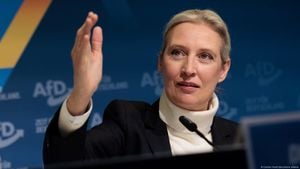The Russian Ministry of Justice has expanded its list of foreign agents by adding several prominent media personalities, including Zhanna Agalakova, a former journalist with substantial experience on federal channels. This update to the foreign agent registry, announced on February 21, 2023, reflects the increasing scrutiny on individuals involved with foreign media or activities deemed not aligned with Russian interests.
Initially hailing from Kirov, Zhanna Agalakova made her mark on Russian television as both a host and reporter. Born in 1965, she built her career by working for influential channels such as NTV until 1999, and most recently for Channel One until her resignation in February 2022, shortly before moving to Paris with her family. Reports indicate she now lives comfortably abroad, continuing to distance herself from the controversies engulfing Russian media.
On the same day the updates were made public, several other notable figures were also listed as foreign agents. These include journalist Ilya Azar, author Elizaveta Alexandrovna-Zorina, comedian Anton Lirnik, and blogger Rustem Adagamov—each contributing significantly to Russia's culture and media narrative. The additions to the registry signal the government’s intent to assert more control over public narratives surrounding major media figures.
Zhanna Agalakova's ties to prominent television channels allowed her to cultivate significant influence. After her departure from Channel One, information surfaced concerning her family life, married to Italian physicist Giorgio Savona, and residing with their daughter Alice, born in Rome. Agalakova's exit from Russian television followed her disagreements with channel mate Ekaterina Andreeva, which allegedly involved disputes over airtime and professional rivalry. Sergey Babaev, another television figure, recounted how the live broadcast awkwardly highlighted the tensions between them and exhibited the difficulties of working within the channel at the time.
“I didn’t understand who was hosting the program—Andreeva or Agalakova... It was live on 'Vremya' for the Far East,” recounted Babaev, emphasizing the professional strain within the network during their respective tenures.
Agalakova's story intersecting with her public persona sparks interest due to the layers of professional conflict she navigated. Transitioning from the vibrant television scene to immigrant life's quietude might suggest her seeking refuge from the turbulence of Russian journalism. Nevertheless, her detachment from Russian media hasn't shielded her from the repercussions related to its increasing paranoia over foreign influences. This reality has entangled many media personalities, pushing them to navigate their careers with caution to avoid direct association with foreign entities.
Attributed controversy surrounds the list of foreign agents as it relates to the broader issue represented by the motivations behind such classifications. Critically, what does it mean for free expression within the media? The recent influx of personalities identifies not just those criticized for downplaying government positions but also erstwhile stars of Russia's entertainment industry, who have willingly leaned toward broader international perspectives.
The current media climate appears woven with fear, where becoming part of the foreign agents registry paves the way for professional and personal ramifications. Stripped of their ability to function without scrutiny, these individuals now face constant questioning of their roles and motivations.
Despite their varied backgrounds, the individuals entering the foreign agents list share the common experience of grappling with the consequences of their personal and professional lives. The casting of their experiences, particularly of Agalakova, who has undergone significant lifestyle changes from her days at Channel One, might reflect the overarching reality of many journalists today.
With the new entries, the Ministry of Justice showcases the tightening grip on public figures, but it also highlights the hard truths media actors must accept as they navigate this politically charged environment. The enduring questions about press freedom and personal agency remain pressing as many wonder what safety measures exist for those still associated with Russian media.
Through the lens of Agalakova and her companions on the foreign agent list, we find reflections of the structural challenges facing communication within oppressive environments as they endeavor to retain their voices—whether through exile or strategic adherence to surviving political climates. Whether they will adapt without losing integrity remains to be seen.



